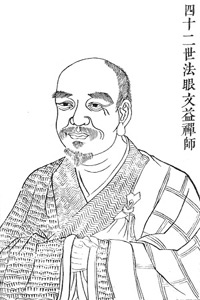Qingliang Wenyi on:
[Wikipedia]
[Google]
[Amazon]
 Qingliang Wenyi (), Biography of the eminent monks of Song dynasty. Vol.13 also known as Fayan Wenyi ()Blue Cliff Records is a
Qingliang Wenyi (), Biography of the eminent monks of Song dynasty. Vol.13 also known as Fayan Wenyi ()Blue Cliff Records is a
 Qingliang Wenyi (), Biography of the eminent monks of Song dynasty. Vol.13 also known as Fayan Wenyi ()Blue Cliff Records is a
Qingliang Wenyi (), Biography of the eminent monks of Song dynasty. Vol.13 also known as Fayan Wenyi ()Blue Cliff Records is a Chinese Buddhist
Chinese Buddhism or Han Buddhism ( zh, s=汉传佛教, t=漢傳佛教, p=Hànchuán Fójiào) is a Chinese form of Mahayana, Mahayana Buddhism which has shaped Chinese culture in a wide variety of areas including Chinese art, art, politics, Ch ...
monk in the early 10th century. Wenyi was born in Yuhang
Yuhang is one of ten urban districts of the prefecture-level city of Hangzhou, the capital of Zhejiang Province, East China. Its 2013 population was estimated at 1.17 million. Its inhabitants speak both Mandarin and a variety of Hangzhounese, ...
. His secular surname is Lu. Fayan school
The Fayan school, or Fayan House () was one of the Five Houses of Chán, the major schools of Chan Buddhism during the later Tang dynasty.
History
Origins
The Fayan school was named after Chinese Zen Master Qingliang Wenyi (885–958).
Via Xuef ...
, one of the main philosophical schools of Zen Buddhism
Zen ( zh, t=禪, p=Chán; ja, text= 禅, translit=zen; ko, text=선, translit=Seon; vi, text=Thiền) is a school of Mahayana Buddhism that originated in China during the Tang dynasty, known as the Chan School (''Chánzong'' 禪宗), and ...
was created by him.
Life
Wenyi became a Buddhist monk by the age of 7.Jingde Chuandenglu. Vol.24 His first tutor was Quanwei Chanbo. He followed monk Xijue to the Ashoka temple of Mingzhou where Xijue and Wenyi preached. He then traveled to the southern city ofFuzhou
Fuzhou (; , Fuzhounese: Hokchew, ''Hók-ciŭ''), alternately romanized as Foochow, is the capital and one of the largest cities in Fujian province, China. Along with the many counties of Ningde, those of Fuzhou are considered to constitute t ...
in search of the solution of his doubts on the subject of Zen. In Fuzhou, Wenyi's knowledge gained him much popularity. However, he was not content with himself and thought that he had not detached himself from the secular world. His departure from Fuzhou eventually led him to Linchuan
Linchuan District () is one of two districts of the city of Fuzhou, Jiangxi province, People's Republic of China.
Before A.D. 762, the administration region located in Chi gang, since then, the administration region moved to western bank of Lianfa ...
. The tradition of Zen Buddhism holds that it was during this particular trip, Wenyi acquired great insight( 頓悟). Knowing that Wenyi is an accomplished Zen philosopher, the king of Nan Tang which ruled over the Linchuan region appointed a temple under his guidance. He would remain in the kingdom of Nan Tang for the rest of his life, promulgating the way of Zen. Wenyi died in the year 958. The King of Nan Tang ordered his royal subjects to wear white clothes for the mourning of Wenyi's death. A pagoda was built in Danyang in honor of Wenyi's spiritual accomplishments. His posthumous title "Zen master Dafayan"(大法眼禪師) was then granted.
Legacy
Wenyi is sometimes referred as Fayan Wenyi for his status as the founder of Fayan school of Zen. The Fayan school was listed as one of the five major schools of Zen Buddhism. Some of his pupils such as Tiantai Deshao, the patriarch of the Kingdom ofWuyue
Wuyue (; ), 907–978, was an independent coastal kingdom founded during the Five Dynasties and Ten Kingdoms period (907–960) of Chinese history. It was ruled by the Haiyan Qian clan (海盐钱氏), whose family name remains widespread in t ...
, Wensui, the Patriarch of Jiangnan
Jiangnan or Jiang Nan (; formerly romanized Kiang-nan, literally "South of the River" meaning "South of the Yangtze") is a geographic area in China referring to lands immediately to the south of the lower reaches of the Yangtze River, incl ...
, and Huiju, Patriarch of Korea
Korea ( ko, 한국, or , ) is a peninsular region in East Asia. Since 1945, it has been divided at or near the 38th parallel, with North Korea (Democratic People's Republic of Korea) comprising its northern half and South Korea (Republic o ...
made major contributions to the promotion of Zen Buddhism in different regions of China and Korea.
References
{{DEFAULTSORT:Wenyi, Qingliang Zen patriarchs Chinese scholars of Buddhism Chan patriarchs 958 deaths Year of birth unknown